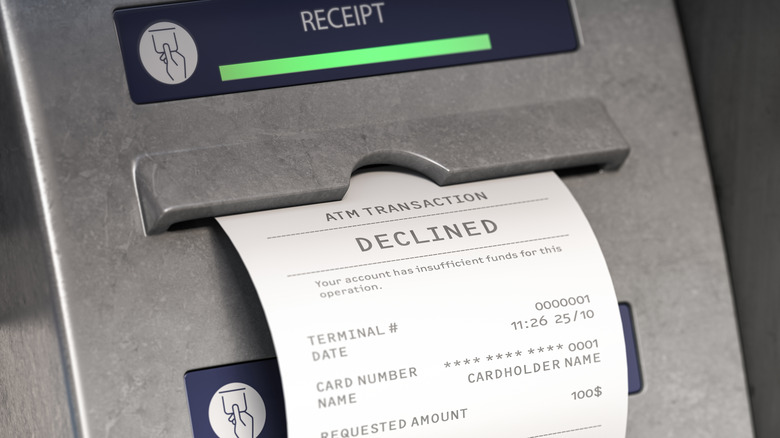13 Warning Signs Of Financial Infidelity You Shouldn't Ignore
Trust is a must-have element for a healthy relationship. Deceit is always a violation of trust, no matter what it's about. Violating a partner's trust about finances or money is absolutely is a form of cheating. Financial infidelity is a very real thing, with serious consequences. It can damage or destroy a relationship just as easily and significantly as physical or emotional infidelity.
There are many warning signs of financial infidelity, including the ones listed below. Warning signs like these can be major money red flags in a partner, with potential consequences too serious to be ignored. If you've noticed warning signs like these in your partner's behavior, there is a very real possibility that you're experiencing financial infidelity. There may be a legitimate explanation, but don't just assume that there is. Rather than trying to convince yourself that you're being silly or looking the other way, get to the bottom of what's causing the behavior. Seeking the truth is the best way to protect your heart and your finances.
Finding large unexpected bank withdrawals
Partners in a healthy relationship who share a bank account should keep one another informed of any withdrawals that could impact the expected availability of funds. If you and your partner have a joint bank account, this means that the money in the account belongs to both of you. You should be able to trust each other concerning how and when deposited funds will be withdrawn and used, especially with large transactions that are unexpected or outside of the norm in your relationship.
If you discover that your partner has taken a large amount of money from your joint account with no discussion, which is usually revealed via a bounced transaction or declined withdrawal, that's a pretty good indicator that you may be experiencing financial infidelity. Taking a large amount of money from a joint account without discussing the withdrawal with one's partner in advance, or at least informing them at the time the money is withdrawn, is a form of deceit. A gaslighting partner might argue that they didn't lie so much as fail to tell you, but that's a technicality. This behavior is an example of lying by omission, which is still a violation of trust.
Keeping financial passwords from you
If your partner seems very concerned with keeping financial passwords secret, that's another big red flag signaling likely financial infidelity in the relationship. This type of secretive behavior can come in many forms. Some financially unfaithful partners will simply refuse to share login details and provide no explanation, while others will overtly gaslight their partner. For example, they might try to tell you that limiting access to themselves is a so-called security strategy to protect the account. No. The only thing they're securing is their own deception.
Some say that they'll keep you informed about funds availability so you don't have to log in and check for yourself (as if they're doing you a favor). Don't fall for that either. They're trying to manipulate you. After all, wouldn't it be faster for you to log in and see for yourself rather than having to ask them? If a partner pulls this with you, it's a pretty safe bet that they're not going to share truthful information about your bank balance.
Opening secret financial accounts
Rather than going to the trouble of hiding activity in a joint bank account from the one they supposedly love, sometimes a financially unfaithful partner will skirt around the issue by opening their own secret financial account. A lot of couples choose to maintain separate bank or credit card accounts — that's not a problematic behavior when it's a decision that the partners make together or (at the very least) both know about. However, when one partner sneaks and opens their own bank account or credit card, or takes out a loan that they hide from the other, that's another matter entirely.
When a partner opens a bank account without telling you, there's a good chance that they're hiding money from you. They're either diverting funds away from the household account(s) or they've gotten a new source of income (honest or ill-gotten) and they don't want you to know about it. When they open a secret credit card or take out a loan you don't know about, there's a good chance that they're racking up debt to fund behaviors or purchases that they want to hide from you.
Hiding debt or assets from you
There's no place for hiding things in a healthy relationship, including debt or assets. Partners who hide debt likely have different motives from those who hide assets, but both behaviors represent financial infidelity. A partner who doesn't disclose previously acquired debt they're still responsible for paying is failing to provide relevant information to their spouse or long-term relationship partner — a behavior also known as lying by omission. One who takes on new debt without looping in their partner is exhibiting active deceit in real-time.
Assets are a different, yet similar story. It's not unusual for one or both partners to come into a relationship with significant assets, but that doesn't mean that it's okay to lie about them. A prenuptial agreement would be a better option than attempting to hide assets. If it turns out that your serious romantic partner is hiding money or other assets from you, that may indicate they don't trust you and are concerned that you may try to take advantage of them. If a partner is hiding assets acquired since you've been together, that could mean they're planning to leave you. After all, you can't lay claim to assets if you don't know they exist.
Lying about or hiding spending
Being dishonest with one's partner about spending is a classic indicator of financial infidelity. Sure, long-term relationships are about love and trust, but money plays an important role as well. Being faithful to a long-term romantic partner most definitely requires being honest about how one is spending money. After all, every partnership requires money, both to cover the cost of living and to support the lifestyle that the partners have agreed upon. If one partner is lying about how much money they are spending or if they are hiding the fact that they are spending money on certain types of purchases, their behavior is, in fact, quite deceitful.
An occasional splurge might not be problematic in and of itself, but engaging in deception about one's spending is another matter entirely. For example, if your partner brings home what seem to be extravagant purchases not accounted for in the budget and claims to have gotten an extremely great price, it's possible that they got really lucky. However, it's also possible that they're not being honest about how much they paid for the item. They may have diverted funds allocated elsewhere in the budget (such as by not paying a bill) or using a credit card that you don't know about.
Being secretive about their pay or job
Lack of openness about one's job or compensation can be an indicator of financial infidelity. Some high earners may seek to downplay how much money they are earning, while others may pretend to make more money than they actually do. In some cases, a person who loses their job may hide that fact from their partner and go so far as to pretend to go to work every day, even though they no longer have a workplace. All of these behaviors are problematic in a relationship, as is the case with all forms of deception.
When someone claims to earn more than they really do or fails to disclose that they've lost their job, this can cause major financial issues. Both partners in a relationship need to know how much money is realistically coming in. When one partner is less than honest in this area, the dishonesty not only damages the relationship but also leads to spending beyond the couple's current means or failing to meet financial obligations. In the case of a partner who downplays their earnings, the one who is being secretive may think they're protecting their partner's feelings or pride when, in reality, they're being dishonest.
Seizing control of the finances
If you find yourself in a relationship with someone who takes it upon themselves to seize control of your finances and/or joint funds, there's a good chance that you're dealing with financial infidelity (or worse). If your partner limits your access to your own money or makes you beg them for funds to meet basic needs, they may be using money as a way of exerting coercive control over you. This type of money-related behavior is an indicator of financial abuse, also known as economic abuse. Regardless of what's motivating your partner to exert undue control over the finances, it's not a sign of a healthy, trust-filled relationship.
If your partner takes over all aspects of money management with no discussion and excludes you from money-related matters, something is motivating their behavior. It may be an attempt to control you, but such behavior could also be an attempt to hide other forms of financial infidelity. If a partner suddenly excludes you from financial matters or starts pushing to drastically cut expenses for no obvious reasons, chances are that something ugly may be going on with your financial situation and they're actively trying to hide it from you.
Steering discussions away from finances
Communication is an important key to a healthy relationship, and partners should be able to discuss concerns openly and honestly. That's why it's extremely concerning when one partner refuses to engage in constructive discussions about financial matters. If your partner tends to change the subject any time you bring up finances, that's something to be concerned about. It's possible that talking about money stresses them out for a legitimate reason, but that doesn't mean the topic should be off-limits. Two of you need to find a way to communicate constructively about such an important topic.
If they're not willing to discuss money at all, this may be an attempt to continue hiding deception. If, rather than being willing to try to explain their hesitancy to talk about finances, your partner responds by stonewalling or becomes overly and inappropriately emotional, their response may be an attempt to manipulate you so they can avoid revealing their financial infidelity. Otherwise, why would someone do this if they don't have something to hide?
Disregarding the household budget
When you and your partner make promises to or agreements with one another, you're both responsible for honoring them. Failing to do so is a form of infidelity, even if the agreement is about your household budget. An agreed-upon budget applies equally to both partners in a relationship, and each partner should be able to trust that the other will honor it. With that in mind, once you and your partner set and agree on a household budget, you should both follow it.
Your budget doesn't apply to just one of you. If something happens to change your joint financial situation, then you should discuss it together and agree to either alter the budget appropriately or make other changes (such as taking on side gigs to bring in more funds) to make the budget work as-is. What should never happen is for one partner to ignore the budget and spend outside of the agreed-upon parameters. A partner who does such a thing is violating the other partner's trust and engaging in financial infidelity.
Being overly possessive of the mail
If your partner suddenly seems to start stalking the mailbox, that's a pretty good sign that they're expecting something to show up that they don't want you to see. They may be on the lookout for a love letter from a secret relationship partner or hate mail from their jealous spouse, but they could just as easily be seeking to snag a bill or financial statement that they don't want you to see. In either case, their unusual possessiveness toward the mailbox is likely to be a sign of some kind of infidelity.
Mailbox stalking isn't the only way mail-related behavior can reveal financial infidelity. If financial statements that usually arrive in the mailbox stop appearing there, your partner may have taken special measures to keep you from seeing them. They could have changed to electronic delivery only without telling you, which you may be able to verify by logging in if the account in question is jointly owned. It's also possible that they diverted the statements to their office, or they could even have gone so far as to set up a post office box that you don't know about.
Constantly leaving the room to take phone calls
Not every phone call should be heard by other people, so the fact that your partner occasionally steps away to answer the phone isn't necessarily an indicator of infidelity, financial or otherwise. However, if your partner suddenly starts getting a lot more phone calls than usual and seeks privacy for most or all of them, that's another matter entirely. A spike in phone call volume could indicate that your partner has a secret love interest, but that's not necessarily the case. An increase in phone calls could be connected to financial infidelity, especially if your partner seems stressed out or alarmed when the phone rings.
If your partner is behind on paying bills or if they've racked up gambling debt, their problems won't stay contained to the mail. It won't take long before they start getting telephone calls from bill collectors. If they have bills or debts they don't want you to know about or if they've been using household money that should be going to bills for other purposes, they'll certainly be motivated to keep you from listening in.
Secretly withdrawing retirement funds
If you discover that your spouse has taken money out of their 401(k), IRA, or other retirement account without discussing it with you first, that is certainly cause for concern, in multiple ways. Of immediate concern is the fact that you're going to take an income tax hit for the full amount of the withdrawal on your joint income taxes for the year. That's not a pleasant thing to be surprised by at tax time, especially if you didn't expect to owe any money or thought you might qualify for a refund.
Beyond even that, though, is the matter of why your partner took a withdrawal in secret to start with. Such a withdrawal may be an attempt to cover up another type of financial infidelity. If one spouse needs access to a chunk of money that they don't want the other to know about, it makes sense (to them) to look to their retirement account as a solution. After all, retirement accounts are individually owned. Dipping into retirement funds is a way for a financially unfaithful partner to access money that isn't in a joint account and without borrowing money.
Rushing you to sign financial documents
Sure, partners often have to sign paperwork for each other. That's a fact of life. Still, it's important to read any document you're being asked to sign before doing so — no matter who is asking you to do the signing. If your partner presents you with paperwork and seems to be rushing you to hurry up and sign quickly without giving you time to read and understand what it is that you're signing, don't give in. Insist on reading the document first, to protect yourself against contract fraud.
Maybe your partner has the best of intentions and is just in a rush, but it's important to remember that you are responsible for every document that you sign. A trustworthy partner will respect your need to fully understand the paperwork before you sign it. Don't let them guilt you into signing before you have all the facts. This is how unsuspecting those with deceptive, financially unfaithful spouses end up putting their names on shady contracts or signing away their rights to assets that would otherwise partially belong to them.













